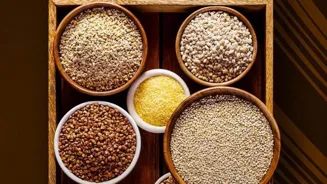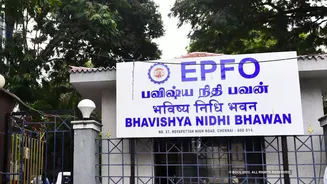Discover the Benefits of Indian Whole Grains: Unlock the Power of Nutrition in Your Daily Meals!
India, a land of diverse cultures and cuisines, boasts a rich culinary heritage deeply rooted in the use
of grains. For generations, whole grains have formed the cornerstone of the Indian diet, providing sustenance and nourishment.
While processed grains have unfortunately gained popularity in recent times, a revival of whole grains is essential for promoting health and wellbeing.
This article explores the incredible benefits of cooking with whole grains, focusing on the Indian staples that can easily be incorporated into your daily meals. Let's rediscover the power of these grains and unlock their potential for a healthier lifestyle.
Whole grains are nutritional powerhouses with vitamins, minerals, and fiber
Whole grains are nutritional powerhouses packed with vitamins, minerals, and fiber. Unlike refined grains, which have had the bran and germ removed, whole grains retain all three parts of the kernel: the bran, the germ, and the endosperm.
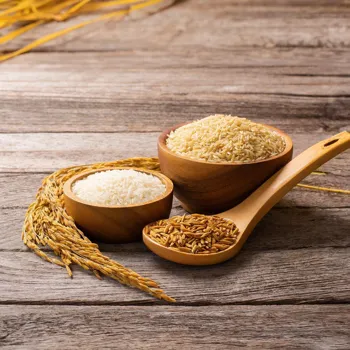
This means that you get the full spectrum of nutrients naturally present in the grain. By choosing to eat whole grains, you are opting to get a wealth of nutrients like B vitamins, iron, magnesium, and selenium that are essential in keeping your bodily process in order.
Fiber is a major element present in whole grains that is particularly beneficial, aiding digestion, regulating blood sugar levels, and promoting a feeling of fullness, which can help in weight management.
Exploring the benefits of whole grains in Indian cuisine
Now, let's delve into some of the most common and beneficial whole grains found in Indian kitchens. Wheat, or atta, is a staple in many Indian households, used to make roti, chapati, and other flatbreads.
Opting for whole wheat flour over refined flour ensures that you get the benefits of the bran and germ, including fiber, iron, and B vitamins. Another popular grain is rice. While white rice is widely consumed, brown rice is a far more nutritious option.
Brown rice is rich in fiber, magnesium, and selenium, offering a more sustained energy release and better blood sugar control. In addition to wheat and rice there are more grains that feature prominently in Indian food.
These include jowar (sorghum), bajra (pearl millet), and ragi (finger millet), are nutritional powerhouses.
Drought-resistant millets rich in nutrients for heart and bone health
Jowar, in particular, is a drought-resistant grain that is rich in antioxidants and fiber, beneficial for heart health and digestion. Bajra, a winter staple in many parts of India, is a good source of iron, magnesium, and potassium. It helps in regulating blood pressure and improving bone health.
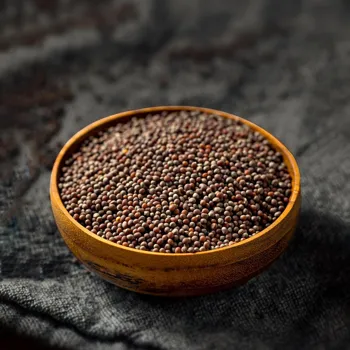
Ragi, also known as finger millet, is exceptionally rich in calcium, making it an excellent choice for strengthening bones and teeth. It also contains iron and essential amino acids, contributing to overall health and wellbeing.
These millets often have a nutty taste that makes them enjoyable when added to different baked goods.
Incorporate whole grains for easy, nutritious meals & snacks
Incorporating these whole grains into your diet is surprisingly easy. Start by replacing refined wheat flour with whole wheat flour for your rotis and chapatis. Experiment with different millet flours, such as jowar, bajra, and ragi, to create unique and nutritious flatbreads.
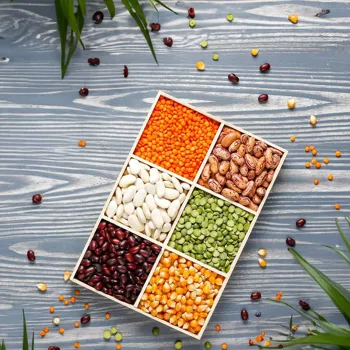
Introduce brown rice into your meals, either as a side dish or as the base for a flavorful curry. You can also incorporate whole grains into snacks and breakfast options. Try making porridge with oats, dalia (broken wheat), or ragi flour.
These options are not only delicious but also provide a sustained energy release, keeping you full and energized throughout the morning.
Regular whole grain consumption promotes holistic health benefits
Beyond the individual nutritional benefits, whole grains have a holistic impact on health. Regular consumption of whole grains has been linked to a reduced risk of chronic diseases such as heart disease, type 2 diabetes, and certain types of cancer.
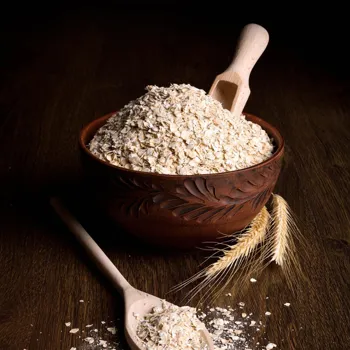
The fiber in whole grains helps to lower cholesterol levels, regulate blood sugar, and promote healthy digestion, all of which contribute to overall wellbeing.
Moreover, the complex carbohydrates in whole grains provide a sustained release of energy, preventing energy crashes and promoting a more stable mood. By making whole grains a part of your daily diet, you are investing in your long-term health and vitality.
Embrace whole grains for better health and well-being
In conclusion, embracing whole grains is a simple yet powerful way to improve your health and wellbeing. By choosing whole wheat flour, brown rice, and millets like jowar, bajra, and ragi, you can unlock the incredible nutritional benefits that these grains have to offer.
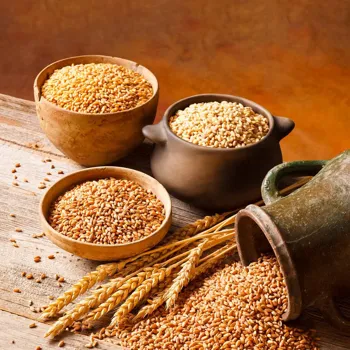
Incorporating these grains into your daily meals is easy and can have a profound impact on your health, reducing your risk of chronic diseases, promoting healthy digestion, and providing sustained energy.
So, let's rediscover the goodness of whole grains and make them an integral part of our Indian diet for a healthier and happier life. Remember to consult with a healthcare professional or registered dietitian for personalized dietary advice.
AI Generated Content. Glance/InMobi shall have no liability for the content